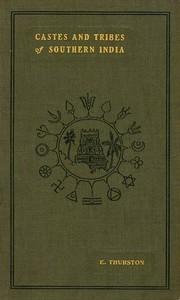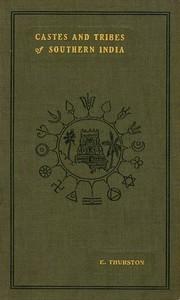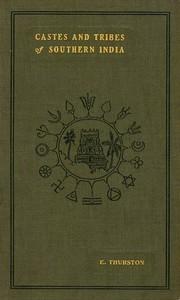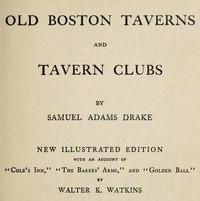|
|
Read this ebook for free! No credit card needed, absolutely nothing to pay.Words: 156856 in 28 pages
This is an ebook sharing website. You can read the uploaded ebooks for free here. No credit cards needed, nothing to pay. If you want to own a digital copy of the ebook, or want to read offline with your favorite ebook-reader, then you can choose to buy and download the ebook.

: Castes and Tribes of Southern India. Vol. 3 of 7 by Thurston Edgar Rangachari K Contributor - Caste India South; Tribes India South; Ethnology India South; India South Social life and customs@FreeBooksWed 07 Jun, 2023 Contributor: K. Rangachari CASTES AND TRIBES OF SOUTHERN INDIA By Superintendent, Madras Government Museum; Correspondant ?tranger, Soci?t? d'Anthropologie de Paris; Socio Corrispondante, Societa, Romana di Anthropologia. Assisted by K. Rangachari, M.A., of the Madras Government Museum. Government Press, Madras CASTES AND TRIBES OF SOUTHERN INDIA. Kabbera.--The Kabberas are a caste of Canarese fishermen and cultivators. "They are," Mr. W. Francis writes, "grouped into two divisions, the Gaurimakkalu or sons of Gauri and the Gangimakkalu or sons of Ganga, the goddess of water, and they do not intermarry, but will dine together. Each has its bedagus , and these seem to be different in the two sub-divisions. The Gaurimakkalu are scarce in Bellary, and belong chiefly to Mysore. They seem to be higher in the social scale than the Gangimakkalu, as they employ Brahmans as priests instead of men of their own caste, burn their dead instead of burying them, hold annual ceremonies in memory of them, and prohibit the remarriage of widows. The Gangimakkalu were apparently engaged originally in all the pursuits connected with water, such as propelling boats, catching fish, and so forth, and they are especially numerous in villages along the banks of the Tungabhadra." Coracles are still used on various South Indian rivers, e.g., the Cauvery, Bhavani, and Tungabhadra. Tavernier, on his way to Golgonda, wrote that "the boats employed in crossing the river are like large baskets, covered outside with ox-hides, at the bottom of which some faggots are placed, upon which carpets are spread to put the baggage and goods upon, for fear they should get wet." Bishop Whitehead has recently placed on record his experiences of coracles as a means of conveyance. "We embarked," he writes, "in a boat which exactly corresponds to my idea of the coracle of the ancient Britons. It consists of a very large, round wicker basket, about eight or nine feet in diameter, covered over with leather, and propelled by paddles. As a rule, it spins round and round, but the boatmen can keep it fairly straight, when exhorted to do so, as they were on this occasion. Some straw had been placed in the bottom of the coracle, and we were also allowed the luxury of chairs to sit upon, but it is safer to sit on the straw, as a chair in a coracle is generally in a state of unstable equilibrium. I remember once crossing a river in the Trichinopoly district in a coracle, to take a confirmation at a village on the other side. It was thought more suitable to the dignity of the occasion that I should sit upon a chair in the middle of the coracle, and I weakly consented to do so. All the villagers were assembled to meet us on the opposite bank; four policemen were drawn up as a guard of honour, and a brass band, brought from Tanjore, stood ready in the background. As we came to the shore, the villagers salaamed, the guard of honour saluted, the band struck up a tune faintly resembling 'See the conquering hero comes,' the coracle bumped heavily against the shelving bank, my chair tipped up, and I was deposited, heels up, on my back in the straw!... We were rowed for about two miles down the stream. The current was very swift, and there were rapids at frequent intervals. Darkness overtook us, and it was not altogether a pleasant sensation being whirled swiftly over the rapids in our frail-looking boat, with ugly rocks jutting out of the stream on either side. But the boatmen seemed to know the river perfectly, and were extraordinarily expert in steering the coracle with their paddles." The arrival in 1847 of the American Missionary, John Eddy Chandler at Madura, when the Vaigai river was in flood, has been described as follows. "Coolies swimming the river brought bread and notes from the brethren and sisters in the city. At last, after three days of waiting, the new Missionaries safely reached the mission premises in Madura. Messrs. Rendall and Cherry managed to cross to them, and they all recrossed into the city by a large basket boat, eight or ten feet in diameter, with a bamboo pole tied across the top for them to hold on to. The outside was covered with leather. Ropes attached to all sides were held by a dozen coolies as they dragged it across, walking and swimming." In recent years, a coracle has been kept at the traveller's bungalow at Paikara on the Nilgiris for the use of anglers in the Paikara river. For the following note on the Kabberas of the Bellary district, I am indebted to Mr. Kothandram Naidu. The caste is sometimes called Ambiga. Breaches of caste rules and customs are enquired into by a panchayat presided over by a headman called Kattemaniavaru. If the fine inflicted on the offender is a heavy one, half goes to the headman, and half to the caste people, who spend it in drink. In serious cases, the offender has to be purified by shaving and drinking holy water given to him by the headman. Both infant and adult marriage are practiced. Sexual license previous to marriage is tolerated, but, before that takes place, the contracting couple have to pay a fine to the headman. At the marriage ceremony, the tali is tied on the bride's neck by a Brahman. Married women carry painted new pots with lights, bathe the bride and bridegroom, etc. Widows are remarried with a ceremonial called Udiki, which is performed at night in a temple by widows, one of whom ties the tali. No married men or women may be present, and music is not allowed. Divorce is said to be not permitted. In religion the Kabberas are Vaishnavites, and worship various village deities. The dead are buried. Cloths and food are offered to ancestors during the Dasara festival, excepting those who have died a violent death. Some unmarried girls are dedicated to the goddess Hulugamma as Basavis . Concerning an agricultural ceremony in the Bellary district, in which the Kabberas take part, I gather that "on the first full-moon day in the month of Bhadrapada , the agricultural population celebrate a feast called Jokumara, to appease the rain-god. The Barikas , who are a sub-division of the Kabbera caste belonging to the Gaurimakkalu section, go round the town or village in which they live, with a basket on their heads containing margosa leaves, flowers of various kinds, and holy ashes. They beg alms, especially of the cultivating classes , and, in return for the alms bestowed , they give some of the margosa leaves, flowers, and ashes. The Kapus, or cultivators, take the margosa leaves, flowers, and ashes to their fields, prepare cholum kanji, mix these with it, and sprinkle this kanji, or gruel, all round their fields. After this, the Kapu proceeds to the potter's kiln in the village or town, fetches ashes from it, and makes a figure of a human being. This figure is placed prominently in some convenient spot in the field, and is called Jokumara, or rain-god. It is supposed to have the power of bringing down the rain in proper time. The figure is sometimes small, and sometimes big." Kabbili.--Kabbili or Kabliga, recorded as a sub-division of Bestha, is probably a variant of Kabbera. Free books android app tbrJar TBR JAR Read Free books online gutenberg More posts by @FreeBooks
: Castes and Tribes of Southern India. Vol. 2 of 7 by Thurston Edgar Rangachari K Contributor - Caste India South; Tribes India South; Ethnology India South; India South Social life and customs@FreeBooksWed 07 Jun, 2023

: Castes and Tribes of Southern India. Vol. 1 of 7 by Thurston Edgar Rangachari K Contributor - Caste India South; Tribes India South; Ethnology India South; India South Social life and customs@FreeBooksWed 07 Jun, 2023
|
Terms of Use Stock Market News! © gutenberg.org.in2025 All Rights reserved.






